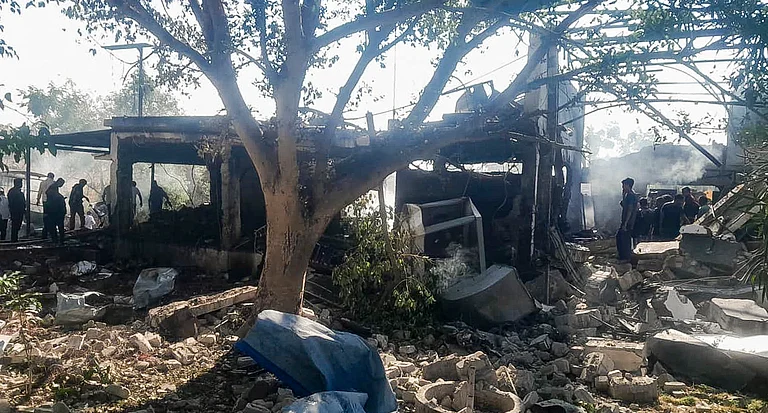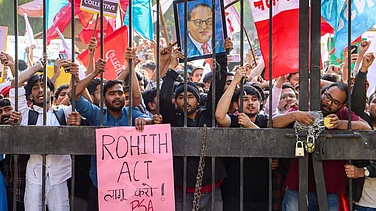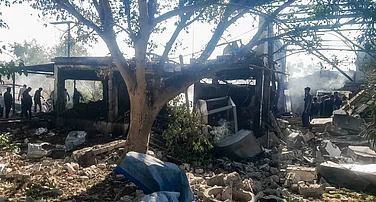On March 12, Mumbaikars woke to the sight of thousands of farmers marching in a disciplined manner under the umbrella of the All India Kisan Sabha (AIKS) to the Azad Maidan in order to stage a protest and present their charter of long-pending demands to the state government. The overwhelming support of other farmers’ groups and political parties forced Devendra Fadnavis’ government to quickly give AIKS a written assurance of time-bound action, followed up by a statement the next day in the assembly.
No wonder AIKS is happy. Its president, Ashok Dhawle, told Outlook “The government has put the written acceptance of our demands, signed by the chief secretary, on the table in the assembly. So it is almost as good as a government resolution.” He went on to add, “We have circulated that among our members so that we can monitor how they are executing it. We will be constantly monitoring and keeping it in the public domain.”
Maharashtra is the second state after Rajasthan where AIKS, an affiliate of the CPI(M), has raised the red flag to press for fulfilment of several longstanding demands of farmers including a farm loan waiver, remunerative prices or extension of MSP (minimum support price) to all agriculture produce through state intervention and implementation of the Swaminathan Commission formula—input cost plus 50 per cent. Additional demands include better irrigation, storage and marketing facilities and improved insurance against weather and price risk, among other points. As almost 40 per cent of the protesters were from the tribal region in north Maharashtra, their demand for land titles as promised under the Forest Rights Act 2006 was raised. In addition, the protesting farmers, who had walked 180 km to present their demands, have sought the updating and reissuing of ration cards in order to include additions to their families, and a rise in the monthly pension from Rs 600 to Rs 3,000.
Hannan Mollah, general secretary of AIKS, says that in the last 7–8 months there has been no action on loan waivers. Only Rs 9,000 crore of a promised Rs 36,000 crore has been waived. This has failed to bring relief to a large number of small and marginal farmers who continue to take loans at exorbitant interest rates from moneylenders and other sources.
The state government has now promised to set up a committee to review loan waivers from 2001 and include those who were left out in 2016–17. The new cut-off date has been fixed as June 30, 2017. The committee will submit its report during the state assembly’s monsoon season.
Dhawle blames the mess in the implementation of the loan waiver on the government decision asking farmers to make online applications instead of getting information from banks. As for the forest rights of those who have been cultivating for decades in such areas, the government has promised a review within six months, while ration cards are to be replaced and updated in the next few months.
The issue of pension enhancement is also to be reviewed and raised in the assembly’s next session. And the government has promised to set up a joint committee on remunerative crop prices with both government and farmers’ representatives on board to finalise the price in a time-bound manner.
AIKS’ demands also include interlinking the Nar-Par rivers with the Godavari and Girnar river basins to improve the water situation in the tribal regions of north Maharashtra—in contrast to existing plans to divert the Nar-Pars’ waters to deficit regions of Saurashtra and Kutch.
Pradeep Purandare, formerly associate professor at the Water And Land Management Institute, Aurangabad, says the water situation in Maharashtra is worse than in most other states due to irrigation scams, bad crop policy, a focus on farm ponds instead of rainwater harvesting, deepening and widening rivers instead of completing downstream projects, and absence of governance for irrigation projects. The fact that there are 400 incomplete irrigation projects, all of which were started three to four decades ago, speaks volumes.
The firm assurance of action that AIKS received has considerably pleased fellow farmers’ groups, many of which have joined hands in the past few years to pressure the government. With the central government passing on decisions on many issues to the states—including the waiving of loans—agitation plans are being reworked. In many cases, close coordination between various groups across the country continues to be the trend.
“AIKS continues to be part of Shetkari Sukanu Samiti (farmers’ steering committee), which organised the farmers’ strike last year. Our interests are not clashing and we are together on the agrarian crisis. However, there is no rule that independent organisations cannot take up independent causes and fight for them,” Dhawle says. “Apart from the loan waiver and the remunerative prices, Sukanu Samiti was not involved in the other issues that we raised about forest land and ration cards, etc., so we did this agitation on our own. There is neither any clash of interest, nor is it required that all organisations fight for all issues.”
Experts, however, feel that for farmers to get their due, it is important that they come together to form a national body. A start was made last year with 184 organisations from 20 states coming together to form the All India Kisan Sangharsh Coordination Committee which includes AIKS. The common concern of the group is to make agriculture profitable and prevent farmer suicides. “There is some coordinated effort to pressure state governments as the central government has passed on many of the decisions to the states. The interesting thing is that it is having impact with 15 states announcing farm loan waivers,” says Prof. Himanshu of JNU. A farm expert, Himanshu feels a cohesive movement at the pan-India level will take some time given the inherent problems with farmer politics and diverse issues facing them, particularly water availability.
“Making agriculture profitable does not require rocket science, only adapting and making better facilities available,” says P. Chengal Reddy, chief advisor, Consortium of Indian Farmers Associations. “However, most politicians don’t understand agriculture issues, and bureaucrats are indifferent.” Reddy opines that agriculture could become more profitable if the input costs were reduced through lower or no GST on fertilisers and pesticides, and if labour costs were shared by using the NREGA work programme to help small and marginal farmers with activities such as sowing, weeding and harvesting.
Agricultural economist Dr T. Haque feels that price and market reforms are needed to ensure remunerative prices. In this regard the proposed integration of 585 major markets is expected to bring relief. Further land leasing reforms along with more investment in irrigation, farm income insurance with cover for both weather and price risk and the extension of agriculture insurance to cover livestock and poultry are among his proposals.
If the central government action during last UP elections is any indication, the wait for agriculture-growth-led reforms is expected to continue unless the farmers force the government to think beyond loan waivers. Experts say the loan waiver push has aggravated the problems by squeezing the fiscal space and driving out much-needed investment in agriculture— in real terms, the latter has declined sharply over the past three years.
By Lola Nayar in New Delhi and Prachi Pinglay-Plumber in Mumbai


























